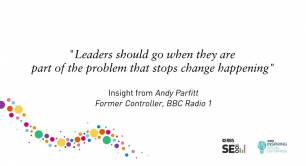Report claims social enterprises exclude "experts by experience"
Social enterprises are excluding the people they aim to help when making senior policy decisions, a new report has found.
At the launch of her new report, The value of lived experience in social change at the House of St Barnabas, Baljeet Sandhu did not hold back in her criticism of the social sector.
“The sector”, she said, “is relatively good at talking about inequalities in wider society, but struggles to talk about inequalities within the sector itself.”
Sandhu is the founding director of the Migrant and Refugee Children’s Legal Unit and a leading children’s rights lawyer.
The result of four years of research, Sandhu’s report for the Clore Social Leadership Programme shines a light on the lack of progress in the social sector’s commitment to incorporating people with lived experience.
Sandhu believes that the sector generally appreciates the value of lived experience in informing social change. Where she sees it failing is appreciating the importance of lived experience in leading change.
The report says those with lived experience are left on the margins of change initiatives, rather than in leadership or organisational roles. Many companies do not involve those with lived experience because of their perceived lack of expertise.
Sandhu argues that lived experience is a form of expertise, and that it’s a form of expertise with equal merit to technical or education expertise.
She found that much of the interaction with those with lived experience is in the form of focus groups or consultations. Her belief is that these can often become glorified feedback sessions, rubber–stamping pre–planned programmes rather than genuinely seeking innovation from individuals and communities.
Many of those with lived experience employed by social enterprises are also being held back in her eyes. Those with lived experience often find themselves stuck on the lowest tier of management structure, directly interfacing with stakeholders.
Although their skills mean that they’re well suited to this type of work, their backgrounds and perceived weaknesses can hold them back from further advancement.
Leaders that Sandhu interviewed expressed doubts about the capacity of people with lived experiences to undertake technical tasks like writing funding bids because they haven’t been through higher education.
Sandhu lamented that social enterprise employers often focused too much on academic qualifications and degrees, instead of lived experience when hiring. She found there is also a tendency in the sector to view those with lived experience as victims or service-users rather than having expertise.
“A fundamental shift is needed in both leadership and organisational development to tackle the issue” Sandhu said. She sees a broad commitment from companies across the sector as vital to opening up the social sector to change–makers with lived experience.
Sandhu singled out a few organisations which were already enacting her recommendations to the rest of the sector.
The Big Lottery Fund’s National Expert Citizens Group is a body which meets quarterly to advise the fund and is made up of experts by experience. The 24 expert citizens from around the country are empowered by the Big Lottery Fund to pioneer initiatives, get involved with research and directly advise the fund.
Sandhu also cited the US based social organisation United We Dream, as having been mentioned repeatedly in her interviews with social enterprise sector leaders on both sides of the Atlantic.
The organisation is immigrant youth-led, and advocates for better treatment for young immigrants across the US. It has successfully grown since the mid-2000s to encompass a network of more than 100,000 immigrant youth and allies and has become a political force in US politics.
Sandhu concluded her report by countering the arguments of many of the leaders she interviewed during her research on why they incorporated so few people with lived experience in meaningful roles.
The protests of CEOs who argued “its tokenistic”, “it’s about merit”, or “lived experience is not expertise” are in her eyes merely flimsy excuses.
Incorporating more experts by experience would, Sandhu argues, lead to benefits for the individual experts, the social enterprise hiring them and the community which they come from and strive to help.
Photo credit: Ana Paula Lima/Pexels



